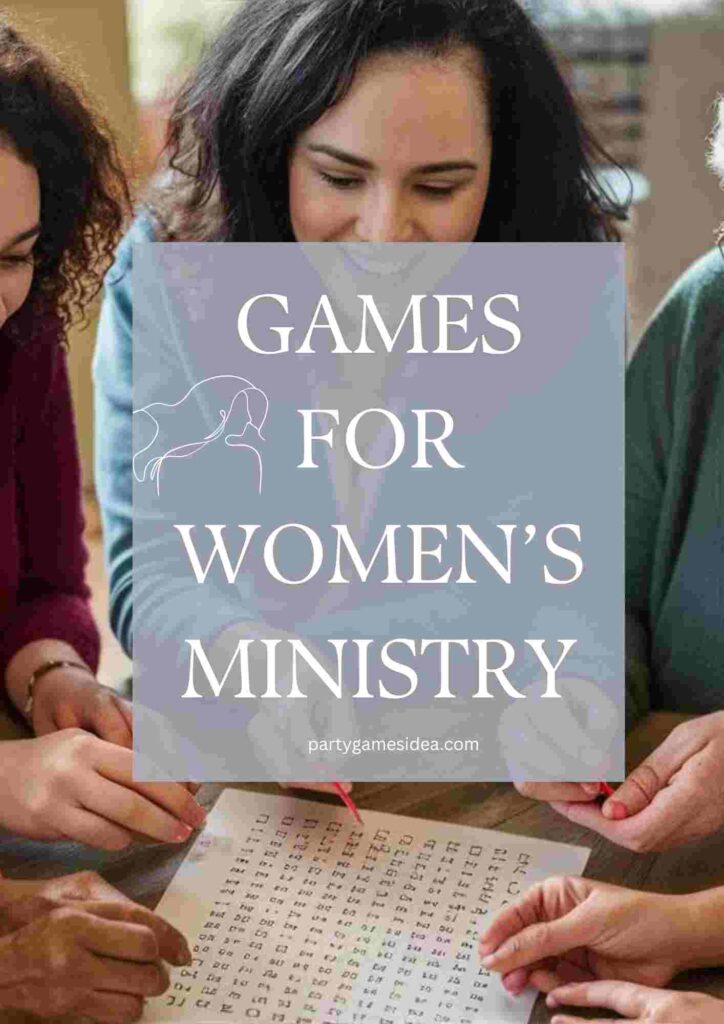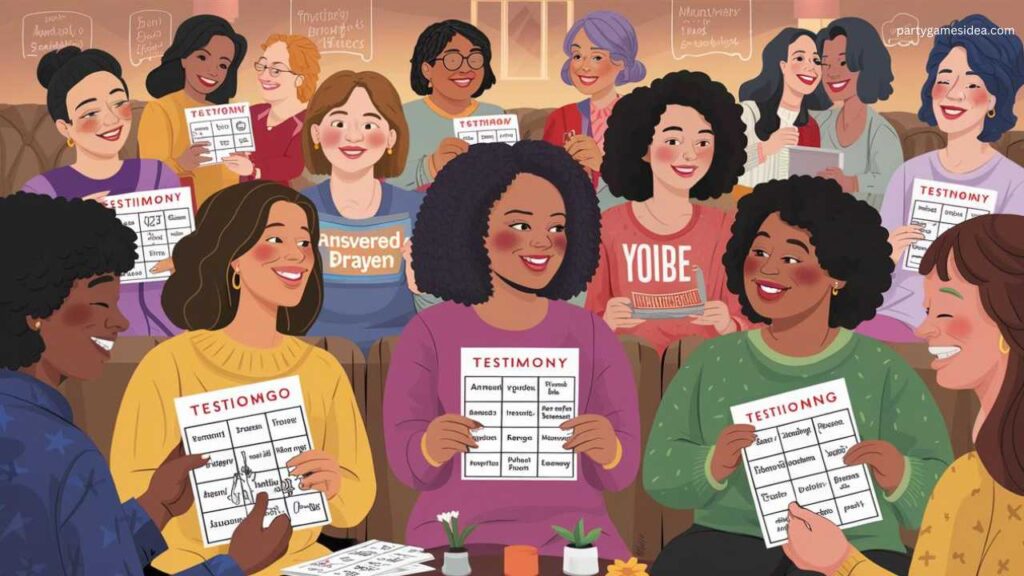In the realm of Games For Women’s Ministry serve as more than just entertainment; they are catalysts for connection, growth, and spiritual reflection. These games provide a platform where women can come together in a relaxed and enjoyable environment, fostering bonds of friendship and shared faith. Whether it’s through laughter-inducing icebreakers or thought-provoking activities, each game is carefully selected to nurture a sense of community and strengthen personal relationships.
The primary purpose of hosting games within a women’s ministry setting is to create a space where participants can engage on multiple levels. Beyond mere amusement, these activities are designed to encourage spiritual growth, promote open dialogue, and deepen understanding of shared beliefs. By participating in these games, women have the opportunity to explore their faith in new ways, share personal insights, and support one another through both joyful moments and deeper conversations.
Furthermore, the event aims to break down barriers and create a welcoming atmosphere where women of all backgrounds and stages of life can feel valued and included. It serves as a platform to celebrate individual strengths, acknowledge common struggles, and build a supportive community rooted in faith and fellowship.
Best Printable Games For Women’s Ministry
Games in women’s ministry are not just about fun; they foster connection, reflection, and growth within the community. These printable games are designed to engage participants in meaningful ways, encouraging laughter, deep conversation, and spiritual enrichment.
In women’s ministry, printable games serve as engaging tools to foster fellowship, encourage spiritual reflection, and create memorable experiences. These games are designed to be accessible, enjoyable, and meaningful, catering to various interests and ages within the group.
1. Name Bingo Challenge
Name Bingo is a classic icebreaker that helps participants learn each other’s names in a fun and interactive way.
How to Play: Each participant receives a bingo card with names instead of numbers. The goal is to mingle and find people whose names match the squares on their card. The first to fill their card with names wins.
Materials Needed: Printable bingo cards with names, pens or markers.
2. Scripture Scramble
Scripture Scramble encourages familiarity with Bible verses while promoting teamwork and problem-solving.
How to Play: Provide scrambled scripture passages. Participants work individually or in teams to unscramble them. The first to correctly unscramble all passages or the most passages within a time limit wins.
Materials Needed: Printable scrambled scripture passages, pens or pencils.
3. Testimony Bingo
Testimony Bingo is a game that encourages sharing personal experiences and fostering empathy among participants.
How to Play: Each participant receives a bingo card with different life experiences (e.g., “Has traveled abroad,” “Speaks more than one language”). Participants share their stories related to the experiences on their card. The first to complete a row, column, or diagonal with shared experiences wins.
Materials Needed: Printable bingo cards with life experiences, pens or markers.
4. Women’s Two Truths and a Lie Challenge
Two Truths and a Lie is an icebreaker game that helps participants get to know each other better in a lighthearted manner.
How to Play: Each participant takes turns sharing two true statements and one false statement about themselves. The group guesses which statement is false. The person with the most correct guesses wins.
Materials Needed: None, just participants willing to share.
5. Coloring Pages
Coloring Pages provide a relaxing and creative activity with a spiritual theme, suitable for reflection and unwinding.
How to Play: Print coloring pages with inspirational quotes or verses related to faith. Participants color the pages using their preferred coloring tools.
Materials Needed: Printable coloring pages, colored pencils or markers.
6. Word Search
Word Search puzzles are enjoyable activities that reinforce learning and reflection on spiritual themes.
How to Play: Print word search puzzles with keywords related to faith or personal growth. Participants search for the words within the grid.
Materials Needed: Printable word search puzzles, pens or pencils.
7. Journaling Prompts
Journaling Prompts encourage introspection and personal growth through guided writing exercises.
How to Play: Print journaling prompts related to faith and personal reflection. Participants choose prompts that resonate with them and write their thoughts and reflections.
Materials Needed: Printable journaling prompts, pens or pencils, journals or paper.
8. Puzzle Challenge
Puzzle Challenges are great for fostering teamwork and problem-solving skills among participants.
How to Play: Print puzzles or riddles for small groups to solve together within a time limit. The group that solves the most puzzles correctly within the time wins.
Materials Needed: Printable puzzles or riddles, pens or pencils.
9. Inspirational Quotes Match-Up
Inspirational Quotes Match-Up is a game that combines spiritual wisdom with a matching challenge.
How to Play: Print cards with halves of inspirational quotes. Participants match the beginnings with their corresponding endings to complete the quotes.
Materials Needed: Printable quote cards with halves, pens or markers.
10. Guess the Bible Character
Guess the Bible Character is a game that tests participants’ knowledge of biblical figures.
How to Play: Print clues or descriptions of different Bible characters. Participants guess the characters based on the clues provided. The person with the most correct guesses wins.
Materials Needed: Printable clue cards, pens or pencils.
11. Charades with Christian Themes
Charades with Christian Themes is a game that combines fun with spiritual concepts.
How to Play: Print or prepare cards with Christian themes, such as Bible stories or virtues. Participants act out the themes without speaking, while others guess what they are portraying.
Materials Needed: Printable charade cards, pens or pencils.
12. Prayer Chain
Prayer Chain is a collaborative game that encourages participants to share prayer requests and support one another spiritually.
How to Play: Print or prepare strips of paper with prayer requests or topics. Participants form a chain by connecting their prayers and discussing how to support each other.
Materials Needed: Printable prayer request strips, pens or pencils.
13. Christian Song Lyrics Quiz
Christian Song Lyrics Quiz tests participants’ knowledge of popular Christian songs and hymns.
How to Play: Print or display lyrics from Christian songs with missing words. Participants fill in the blanks or guess the song based on the lyrics provided. The person with the most correct answers wins.
Materials Needed: Printable song lyrics with missing words, pens or pencils.
14. Bible Verse Fill-in-the-Blanks
Bible Verse Fill-in-the-Blanks challenges participants’ knowledge of scripture.
How to Play: Print or display Bible verses with missing words. Participants fill in the blanks to complete the verses. The person with the most correct completions wins.
Materials Needed: Printable Bible verses with missing words, pens or pencils.
15. Fruit of the Spirit Matching Game
Fruit of the Spirit Matching Game focuses on biblical virtues and their meanings.
How to Play: Print cards with names of the fruits of the Spirit (e.g., love, joy, peace) and their definitions. Participants match the names with the correct definitions.
Materials Needed: Printable cards with fruit of the Spirit names and definitions, pens or markers.
16. Christian Book Title Scramble
Christian Book Title Scramble challenges participants’ knowledge of Christian literature.
How to Play: Print or display scrambled titles of Christian books. Participants unscramble the titles to identify the correct books. The person with the most correct answers wins.
Materials Needed: Printable scrambled book titles, pens or pencils.
17. Faith-themed Crossword Puzzle
Faith-themed Crossword Puzzle combines learning with entertainment.
How to Play: Print crossword puzzles with clues related to faith, Bible stories, or Christian concepts. Participants fill in the blanks to complete the puzzle.
Materials Needed: Printable crossword puzzles, pens or pencils.
18. Christian History Timeline
Christian History Timeline educates participants about key events and figures in Christian history.
How to Play: Print or display timeline events with brief descriptions. Participants arrange the events in chronological order. The person with the most accurate timeline wins.
Materials Needed: Printable timeline events with descriptions, pens or markers.
19. Faith-based Word Association
Faith-based Word Association is a game that challenges participants to connect words with spiritual meanings.
How to Play: Print or display a list of words related to faith or Christian life. Participants associate each word with another word that has a similar or related meaning.
Materials Needed: Printable word list, pens or pencils.
20. Christian Trivia Challenge
Christian Trivia Challenge tests participants’ knowledge of various aspects of Christianity.
How to Play: Print or display trivia questions covering topics such as Bible knowledge, church history, and Christian traditions. Participants answer the questions, and the person with the most correct answers wins.
Materials Needed: Printable trivia questions, pens or pencils.
How To play these Games For Women’s Ministry?
Playing games in a women’s ministry setting can be a fun and engaging way to build community, encourage fellowship, and reinforce key messages or themes. Here’s a general guide on how to effectively play games in a women’s ministry:
1. Choose Appropriate Games:
- Consider the Audience: Tailor games to the age group, interests, and preferences of the women involved.
- Align with Purpose: Select games that support the goals of the ministry, whether it’s fostering community, learning, or spiritual growth.
2. Set Up and Prepare:
- Arrange Space: Ensure there is enough room for participants to move around comfortably, if needed.
- Gather Materials: Prepare any necessary supplies or materials for each game or activity in advance.
3. Explain the Game Clearly:
- Instructions: Provide clear, concise instructions for each game.
- Demonstration: Consider demonstrating how to play the game or providing a practice round to ensure everyone understands.
4. Create a Positive Atmosphere:
- Encourage Participation: Foster a welcoming environment where everyone feels comfortable joining in.
- Emphasize Fun: Highlight the enjoyment of playing together rather than focusing solely on competition.
5. Facilitate Engagement:
- Team Formation: Organize participants into teams or pairs, depending on the game.
- Encourage Interaction: Promote interaction and teamwork throughout the games.
6. Celebrate and Reflect:
- Acknowledge Achievements: Recognize efforts and successes during the games.
- Reflect on Themes: Connect the games to the broader themes or messages of the ministry through debriefing or discussion.
7. Adapt as Needed:
- Flexibility: Be prepared to adjust games based on group dynamics or unforeseen circumstances.
- Time Management: Monitor time to ensure games progress smoothly and align with the event schedule.
8. End on a Positive Note:
- Closure: Conclude with a brief wrap-up or reflection that ties the games back to the ministry’s objectives.
- Gratitude: Express appreciation to participants for their involvement and contributions.
9. Follow-Up:
- Feedback: Seek feedback from participants to improve future events.
- Next Steps: Encourage ongoing engagement or participation in upcoming ministry activities.
By following these steps, you can create a meaningful and enjoyable experience through games in a women’s ministry, fostering fellowship and spiritual growth among participants.
Benefits of playing Games For Women’s Ministry
Playing games in a women’s ministry setting can offer a variety of benefits, enhancing both personal and group dynamics. Here are some key advantages:
1. Building Community and Fellowship:
- Bonding: Games promote interaction and help women get to know each other better, fostering deeper connections within the ministry.
- Inclusivity: By encouraging participation and teamwork, games create a sense of belonging and unity among participants.
2. Promoting Communication and Social Skills:
- Icebreakers: Games serve as effective icebreakers, easing initial awkwardness and encouraging conversation among women who may be unfamiliar with each other.
- Teamwork: Cooperative games teach teamwork and collaboration skills, enhancing communication and problem-solving abilities.
3. Encouraging Fun and Relaxation:
- Stress Relief: Games provide a break from routine and allow women to unwind, promoting relaxation and reducing stress.
- Laughter and Joy: Shared laughter during games fosters a positive atmosphere and uplifts spirits, contributing to overall well-being.
4. Facilitating Learning and Growth:
- Educational Value: Games can be designed to convey spiritual lessons, biblical principles, or messages relevant to the ministry’s themes.
- Personal Development: Some games promote self-awareness, empathy, and emotional intelligence, supporting personal growth and reflection.
5. Enhancing Creativity and Problem-Solving Skills:
- Creative Expression: Crafting or creative games encourage women to explore their creativity and express themselves in new ways.
- Critical Thinking: Strategy or puzzle games stimulate critical thinking and problem-solving skills, fostering mental agility and resilience.
6. Supporting Ministry Objectives:
- Reinforcing Messages: Games can reinforce key messages or themes of the ministry, helping women to internalize and apply spiritual teachings.
- Engagement: Interactive games increase engagement in ministry activities and events, encouraging ongoing participation and commitment.
7. Celebrating Achievements and Successes:
- Recognition: Games provide opportunities to celebrate individual and team achievements, boosting confidence and morale.
- Unity: Shared victories in games cultivate a sense of shared accomplishment and solidarity among participants.
8. Creating Lasting Memories:
- Memorable Experiences: Enjoyable and meaningful game experiences create lasting memories, strengthening bonds and encouraging women to return for future ministry activities.
Overall, games in a women’s ministry setting serve as valuable tools for fostering relationships, personal growth, and spiritual enrichment, contributing to a vibrant and supportive community of faith.
Closing Activity
The “Reflective Circle” closing activity is designed to provide a meaningful conclusion to a gathering in a women’s ministry, allowing participants to reflect on their experiences and share insights in a supportive environment. Here’s how you can facilitate this activity effectively:
Preparation:
- Arrange the Setting:
- Ensure chairs are arranged in a circle to promote inclusivity and facilitate eye contact and engagement among participants.
- Create a comfortable and relaxed atmosphere conducive to reflection and sharing.
- Timing:
- Allocate sufficient time for each participant to share without rushing. Depending on the group size, plan accordingly to ensure everyone has the opportunity to contribute.
Instructions:
- Introduction:
- Begin by thanking everyone for their participation throughout the event.
- Explain the purpose of the Reflective Circle: to provide a space for each participant to express one thing they learned or appreciated from the day’s activities.
- Sharing Guidelines:
- Encourage honesty and openness in sharing thoughts and insights.
- Remind participants to actively listen to each other without interrupting.
- Facilitation:
- Start the sharing process by inviting the first participant to speak.
- Each participant takes turns sharing their reflection. They can share a specific learning, a memorable moment, a personal insight, or an appreciation for something meaningful experienced during the event.
- Listening and Validation:
- As each participant shares, encourage others to listen attentively and respectfully.
- Facilitate a supportive environment where participants can validate each other’s reflections through nods, smiles, or affirming responses.
- Closure:
- After everyone who wishes to share has done so, offer a brief summary or reflection on the themes or common insights expressed.
- Conclude with a final thank you and any closing remarks, emphasizing the importance of the shared experience and the value of community in the ministry.
Benefits:
- Reflection: Allows participants to internalize and process their experiences, enhancing personal growth and understanding.
- Community Building: Strengthens bonds among participants as they share and validate each other’s perspectives.
- Closure: Provides a meaningful conclusion to the event, leaving participants with a sense of fulfillment and connection.
The Reflective Circle activity not only reinforces the day’s lessons and highlights but also fosters a sense of unity and mutual support within the women’s ministry, creating a memorable and impactful closure to the gathering.
FAQ
What types of games are suitable for a women’s ministry event?
Games for women’s ministry events should align with the goals of fostering community, encouraging spiritual growth, and providing opportunities for fun and fellowship. Icebreaker games are excellent for helping participants get to know each other and feel comfortable in the group. These can include activities like “Two Truths and a Lie” or “Human Bingo,” which promote interaction and laughter.
Team-building games are also beneficial, as they encourage collaboration and strengthen relationships. Activities such as the “Marshmallow Tower Challenge” or an escape room-style puzzle can promote teamwork while providing an engaging and challenging experience. Additionally, games that incorporate scripture or teach biblical principles, like “Bible Trivia” or themed scavenger hunts, can deepen participants’ understanding of faith while fostering a sense of community and shared purpose. Overall, the best games for women’s ministry events are those that blend enjoyment with opportunities for personal connection and spiritual enrichment.
How do games contribute to the women’s ministry experience?
Games play a vital role in enhancing the women’s ministry experience in several ways. Firstly, they foster a sense of community and belonging by encouraging interaction and bonding among participants. Games provide a relaxed and enjoyable environment where women can connect on a personal level, building relationships that extend beyond the event itself.
Secondly, games promote spiritual growth and reflection. Many activities can be designed to incorporate biblical teachings or themes, helping participants apply these principles in practical ways. This integration of faith into games encourages deeper discussions and insights, enhancing the overall spiritual journey of participants.
Thirdly, games contribute to personal development by promoting skills such as teamwork, communication, and problem-solving. Through cooperative challenges or creative activities, women can learn to work together effectively, build trust, and support one another in achieving common goals.
Overall, games in women’s ministry events serve as powerful tools for building community, enriching spiritual understanding, and fostering personal growth, creating a meaningful and memorable experience for participants.
How can games be tailored to fit different age groups and preferences?
Games can be effectively tailored to fit different age groups and preferences by considering several key factors:
- Complexity and Difficulty Level:
- Adjust the complexity of the game mechanics and rules based on the age and skill level of participants. For younger age groups, simpler games with straightforward instructions and fewer rules may be more suitable. Older participants may enjoy more complex challenges that require strategic thinking or advanced skills.
- Physical Requirements:
- Consider the physical abilities and limitations of participants when selecting games. Games that involve physical activity should be adapted to ensure they are safe and accessible for all age groups. Alternatively, offer a variety of games that cater to different levels of physical exertion.
- Themes and Interests:
- Tailor games to align with the interests and preferences of different age groups. For example, younger participants may enjoy games with themes related to popular culture or trends, while older groups may prefer games that incorporate deeper spiritual or life-related themes.
- Social and Interaction Styles:
- Adjust the format of games to accommodate different social and interaction styles. Introverted participants may appreciate games that allow for quieter reflection or individual participation, such as trivia quizzes or creative activities. Extroverted participants may thrive in games that involve group discussions, teamwork, or lively competition.
- Time and Attention Span:
- Consider the attention span and endurance of participants when planning games. Shorter, more focused games may be better suited for younger age groups or events with limited time. For longer events, include a mix of activities to maintain engagement and prevent fatigue.
- Feedback and Adaptation:
- Seek feedback from participants to gauge their preferences and experiences with different games. Use this feedback to adapt future game selections and formats to better meet the needs and interests of various age groups within the women’s ministry.
By carefully considering these factors and adapting games accordingly, you can ensure that participants of all ages and preferences feel included, engaged, and enriched by the games offered in your women’s ministry events.
Can games be used to reinforce spiritual teachings or messages?
Yes, games can be powerful tools for reinforcing spiritual teachings or messages in a women’s ministry context. Here’s how games can effectively integrate and reinforce spiritual themes:
- Biblical Insights and Lessons: Games can be designed to incorporate stories, principles, and teachings from the Bible. For example, trivia games focused on biblical characters or events can help participants deepen their knowledge and understanding of scripture.
- Application of Faith: Games can encourage participants to apply spiritual teachings in practical scenarios. For instance, role-playing games or problem-solving activities can simulate real-life situations where participants must make decisions based on biblical principles.
- Discussion and Reflection: Games can prompt meaningful discussions that explore spiritual themes or personal faith journeys. Activities like group discussions following a game can encourage participants to share insights, ask questions, and apply lessons learned to their lives.
- Personal Growth: Games can foster personal growth by challenging participants to reflect on their values, beliefs, and spiritual practices. Creative activities or storytelling games can prompt introspection and encourage participants to explore their faith in new ways.
- Community Building: By engaging in games that reinforce spiritual teachings, participants can strengthen their sense of community and shared faith. Collaborative games that promote teamwork and mutual support can further enhance spiritual connections among participants.
Overall, integrating games with spiritual teachings in women’s ministry events not only enriches the educational aspect but also deepens participants’ spiritual experiences, fostering a stronger connection to faith and community within the group.

-
Save
Hi, I’m Hailey Say, the proud mom and owner of PartyGamesIdea.com. As a dedicated party designer and an expert in party ideas, I have a deep passion for crafting memorable and enjoyable experiences for every occasion. From holiday games to baby showers, bridal showers, bachelor parties, group gatherings, and more, I specialize in creating unique and fun party ideas that cater to all age groups and interests.
With an extensive collection of ideas ranging from printable games, teen and adult games, kids’ party activities, birthday party games, girls’ games, memory games, family games, and outdoor games, I aim to make every event special. My expertise also extends to themed parties such as dinner parties, brunch parties, graduation celebrations, college parties, and fun night games.
On PartyGamesIdea.com, I share my passion and creativity, helping people turn their party visions into reality. With years of experience and a keen eye for detail, I am committed to making your event planning process enjoyable and stress-free. Join me on PartyGamesIdea.com, and together, we’ll create unforgettable memories for you and your loved ones.











